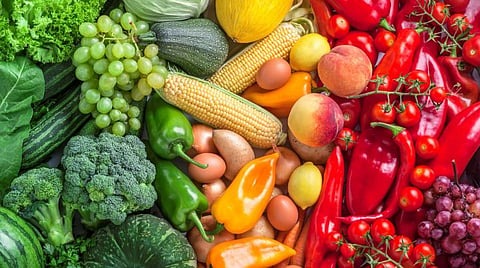
- Home
- Live Blog
- Breaking News
- Top Headlines
- Cities
- NE News
- Sentinel Media
- Sports
- Education
- Jobs

Prof (Dr) B K Mukhopadhyay,
Dr Boidurjo Rick Mukhopadhyay
(Dr BK Mukhopadhyay is professor of management and author of the book India’s Economy: Under a Tinsel still Tough, and can be reached at m.bibhas@gmail.com; Dr BR Mukhopadhyay is an international development and management economist based in London)
Macro lockdowns to contain COVID-19 outbreak have started hurting the supply of manpower and disrupted supply chains in the agriculture industry, among others. The United Nations’ Food and Agriculture Organization [FAO] warns that the world risks a ‘looming food crisis’ unless measures are taken fast to protect the most vulnerable, keep global food supply chains alive and mitigate the pandemic’s impacts across the food system. As of now though, disruptions appear minimal as food supplies have been adequate, yet price spikes are more likely to take off for higher-value products like meat and perishable commodities rather than for major staples that are still in adequate supply.
The corona virus outbreak could affect food security as the global pandemic continues to disrupt labour availability and the supply chain. The FAO said recurring disruptions would flow through April and May, “a looming food crisis unless measures are taken fast to protect the most vulnerable, keep global food supply chains alive and mitigate the pandemic’s impacts across the food system…restrictions on movements and basic aversion behaviour by workers could impede farming”. Food processors, who handle the vast majority of agricultural products, could also be prevented from processing the farm products.
Another study suggests that global food supply is relatively ample with the outlook for the 2020 to 2021 crop year positive, thanks to mild weather conditions in key producing regions. Grain production in developed markets, usually done on large farms in low-density areas are less prone to contagion, but labour-intensive sectors such as plantations (palm oil) and manufacturing (meat processing) are more at risk of employee contagion and therefore of temporary lockdown measures.
Fitch solutions assesses that despite more than sufficient supplies of staple food, notwithstanding manpower and logistical challenges, any artificial restriction by nations reserving strategic supplies would heighten risks. Some countries could resort to trade restrictions or aggressive stockpiling in a bid to safeguard food security; this could quickly escalate and support grain and oilseed prices. Countries that are most exposed to a rise in food price inflation include those with elevated imports as a share of domestic food supply, such as the Middle East, China, Japan and South Korea.
Fears expressed are not unfounded inasmuch as among the major crop producing countries that have already implemented export restrictions there are Vietnam, which has curbed rice exports and Russia, the country has halted processed grain exports. Kazakhstan has also suspended exports of wheat flour, buckwheat, sugar, sunflower oil, and some vegetables.
The fear has another possible origin: some countries could resort to trade restrictions or aggressive stockpiling in a bid to safeguard food security, which could quickly escalate and support grain and oilseed prices. More so, even the slightest measure affecting the free movement of people and goods will strain the global food chain further. The ‘ASEAN Food and Beverage Alliance’ categorically maintains that ‘any restriction of movement, including the workforce, will affect the stability of food production’.
The ASEAN Food and Beverage Alliance called for governments across the region to ensure the unhindered production and supply for food and beverages. “During a lockdown, if governments across the region put in place policies that hinder production across supply chains as well as trade barriers, this could lead to regional food shortages, especially when looking across the world and seeing the continued but unnecessary panic buying behavior,” accordingly. Such moves could also lead to an acceleration of food price inflation during a time when consumers are concerned about lockdowns and have created their own stockpiles at home.